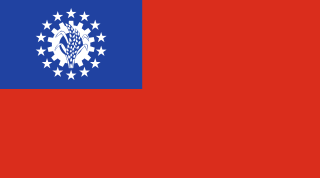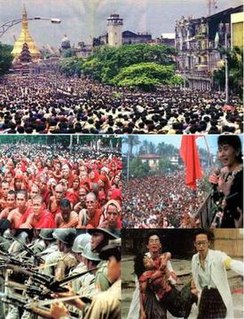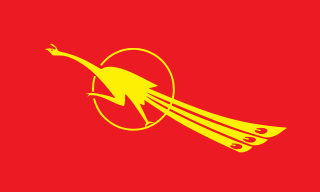
Myanmar operates de jure as a unitary assembly-independent republic under its 2008 constitution. On 1 February 2021, Myanmar's military took over the government in a coup. Anti-coup protests are ongoing as of 24 February 2021.

Ne Win was a Burmese politician and military commander who served as Prime Minister of Burma from 1958 to 1960 and 1962 to 1974, and also President of Burma from 1962 to 1981. Ne Win was Burma's military dictator during the Socialist Burma period of 1962 to 1988.
The history of Myanmar covers the period from the time of first-known human settlements 13,000 years ago to the present day. The earliest inhabitants of recorded history were a Tibeto-Burman-speaking people who established the Pyu city-states ranged as far south as Pyay and adopted Theravada Buddhism.

Nu, commonly known as U Nu also known by the honorific name Thakin Nu, was a leading Burmese statesman and nationalist politician. He was the first Prime Minister of Burma under the provisions of the 1947 Constitution of the Union of Burma, from 4 January 1948 to 12 June 1956, again from 28 February 1957 to 28 October 1958, and finally from 4 April 1960 to 2 March 1962.

The Burma Socialist Programme Party (BSPP) was Burma's ruling party from 1962 to 1988 and sole legal party from 1964 to 1988. Party chairman Ne Win overthrew the country's democratically elected government in a coup d'état on 2 March 1962. For the next 26 years, the BSPP governed Burma under a totalitarian military dictatorship, until mass protests in 1988 pressured party officials to adopt a multi-party system.

The State Peace and Development Council was the official name of the military government of Burma (Myanmar), which in 1997, succeeded the State Law and Order Restoration Council (Burmese: နိုင်ငံတော်ငြိမ်ဝပ်ပိပြားမှုတည်ဆောက်ရေးအဖွဲ့ that seized power under the rule of Saw Maung in 1988. On 30 March 2011, Senior General and Council Chairman Than Shwe signed a decree that officially dissolved the Council.

The University of Yangon, located in Kamayut, Yangon, is the oldest university in Myanmar's modern education system and the best known university in Myanmar. The university offers mainly undergraduate and postgraduate degrees programs in liberal arts, sciences and law. Full-time bachelor's degrees were not offered at the university's main campus after the student protests of 1996. The bachelor's degree was re-offered from 2014 on, to the best students in the country. Today degrees in Political Science are offered to undergraduate students, as well as postgraduate diplomas in areas such as social work and geology.
The Burmese Way to Socialism, also known as the Burmese Road to Socialism, was the state ideology of the Socialist Republic of the Union of Burma, the socialist state governed by the Burma Socialist Programme Party (BSPP) from 1962 to 1988.

The Socialist Republic of the Union of Burma, known as the Union of Burma from 1962 to 1974, was the Burmese state under the military dictatorship of Ne Win from 1962 to 1988. It was established by the Union Revolutionary Council (RC), the military junta founded by Ne Win and his allies in the Tatmadaw after they overthrew the democratically elected government of Prime Minister U Nu in a coup d'état on 2 March 1962.

The 8888 Uprising, also known as the People Power Uprising and the 1988 Uprising, was a series of nationwide protests, marches, and riots in Burma that peaked in August 1988. Key events occurred on 8 August 1988 and therefore it is commonly known as the "8888 Uprising". The protests began as a student movement and were organised largely by university students at the Rangoon Arts and Sciences University and the Rangoon Institute of Technology (RIT).
Maung Maung was the seventh president of Burma, and a well-known writer.
Brigadier General Aung Gyi was a Burmese military officer and politician. He was a cofounder of the National League for Democracy and served as president of the party.

The president of the Republic of the Union of Myanmar is the head of state and constitutional head of government of Myanmar. The president leads the Cabinet of Myanmar, the executive branch of the Burmese government. The current president is Myint Swe, who assumed the presidency in an acting capacity through a military coup d'état on 1 February 2021.
Brigadier General Sein Win was a Burmese military officer who fought along with the legendary Thirty Comrades in the struggle for independence from Britain. He later held various positions in the government of Burma from 1962 to 1977 and served as Prime Minister of Burma.

The Constitution of the Republic of the Union of Myanmar is the supreme law of Myanmar. Myanmar's first constitution adopted by constituent assembly was enacted for the Union of Burma in 1947. After the 1962 Burmese coup d'état, a second constitution was enacted in 1974. The country has been ruled by military juntas for most of its history.

The All Burma Federation of Student Unions (ABFSU) is a left-wing umbrella organization for student unions in Burma. They advocate for academic freedoms, and student rights, but also, Left-wing Populism and Progressivism. ABFSU offers a source of information to the outside world, reporting regularly on the developments of the military government (SPDC).
The 1962 Burmese coup d'état on 2 March 1962 marked the beginning of one-party rule and the political dominance of the army in Burma which spanned the course of 26 years. In the coup, the military replaced the civilian AFPFL-government, headed by Prime Minister U Nu, with the Union Revolutionary Council, Chaired by General Ne Win.
Military rule in Myanmar lasted from 1962 to 2011 and resumed in 2021. Myanmar gained its independence from the British Empire in 1948 under the Burmese Independence Army, as a democratic nation. The first military rule began in 1958 and direct military rule started when Ne Win captured power through a coup d'état in 1962. Burma became a military dictatorship under the Burma Socialist Programme Party that lasted for 26 years, under the claim to save the country from disintegration. During this period there was some democratic landscape in the form of giving rights to the citizen to elect and to stand for election.
As a protracted armed conflict spanning more than seven decades, the internal conflict in Myanmar has involved over fifty different armed groups, three military juntas, and seven civilian-led governments.







